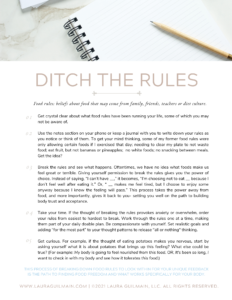
The phrase Food Freedom is getting a lot of attention.
I am thrilled more people are taking a closer look at their relationship with food and body image. If that’s you (yay!), you’ll likely come across the word food freedom in the process. You’ll also see a variety of definitions for this phrase. Dig deeper, and you’ll see members of the health community and leaders of this movement getting into disagreements over what this term means.
Let it be.
Really!
I, for one, think it’s fantastic that people are finding a unique relationship to this phrase that’s meaningful for them. I mean, if we can’t have liberties with the definition of our personal relationship with food and how it relates to freedom, then we all need to relax a bit. Which we probably need to do anyway.
Before I further encourage you to explore your food ideology, I’ll share my food freedom definition.
Food freedom is an individualized, holistic experience where you are operating from conscious awareness on what types of foods and eating styles do to your physical and emotional bodies. From that place, you choose your experience, loving your reason why.
For example, sometimes you’ll choose to overeat or have a sugary dessert because you want the experience with loved ones. Or you’re traveling and won’t have access to the gelato in Italy again, etc. Here’s another example: speaking of gelato, I have an allergy to cow’s milk protein. Even though I have (non-life threatening) side effects for days after consuming milk, you better believe I chose to eat gelato in Italy! I ate it with my senses turned on and tuned in and enjoyed every.single.bite.
My definition of food freedom centers upon feeling in control of food instead of controlled by food.
You may see a red flag with the word control. Hold up. I see your gears turning.
Let me elaborate.
The control I am speaking of is not overly restrictive or punishing. The orientation is in self-love, self-care, confidence, and consciousness.
Let me be clear: you can have anything you want when you want it. And there’s no need for guilt and shame on this journey. It’s time to take the morality out of food.
Even as a practitioner who supports body autonomy and a holistic approach to weight loss after healing your relationship to food and body image, I still don’t think any foods are off-limit.
The intention with food freedom is to stay connected to a few questions:
- Did I plan this ahead of time, or am I emotionally reacting rather than processing an uncomfortable feeling?
- Do I want it (regardless of the answer to #1)?
- Do I love my reason why?
- Can I decide ahead of time to be kind to myself on the other side of this meal/snack, fully knowing no single decision or day has the power to keep me from my goals for food freedom and wellbeing? In other words, can I commit to myself that this action will not “knock me off the wagon” headed towards my goals?
Based on your grounded, honest answers to those questions, I encourage you to adjust your food plan in whatever way you feel serves your highest good. Food is holistic- offering pleasure, connection, and nourishment. But a lot of things nourish besides food.
REAL TALK: If you’re not really hungry for food and you’re actually looking for another type of nourishment (i.e., sleep, having a difficult conversation, getting the task done, etc.), no amount of food will satisfy you.
Asking yourself the 4 questions above will help you stay connected to your food freedom.
I’d encourage you to take some time reflecting on your beliefs about food and nourishment to create your definition of food freedom. It may look something like connecting with a sustainable way of eating based on what you know makes you feel your best and is in service of your goals and values.
It’s common to eat a certain way because of someone’s advice or recommendation. It’s beneficial to learn from others- it’s how we thrive and evolve- but when doing so, apply your critical thinking and expert knowledge of yourself to this information. Otherwise, you’re assigning expert status to someone outside of you. Trust yourself to do a deep dive to audit your views about food and reflect on how you feel best- physically, emotionally, and energetically.
In my book, nothing is off-limits, but I don’t eat it all, all the time. If I did, I wouldn’t be feeling my best or honoring my best. That’s my food freedom.
REAL TALK: If you’re honest and slow down to tune in, you know certain foods aren’t worth it, and when you take a moment to pause and check-in, you can recognize when you want to buffer with food.
I’m not saying it’s easy to stop buffering. Still, it becomes more accessible and very doable with support, which I offer to my clients in my comprehensive 1:1 and group coaching programs to heal their relationships with food and body image.
Together, I support you in learning about you.
It’s a process of uncovering the belief systems you run off (that affect much more than just your choices around food and body) and how to be deliberate in your decisions. From this place, you can take conscious actions to honor what you want from a place of clarity and integrity. Sometimes that’s no ice cream; other times, it’s a small bowl of ice cream. And guess what? It could also look like a big bowl of ice cream.
The key to food freedom is to decide ahead of time to honor you, which is a holistic choice. One that takes your emotional, physical, and spiritual needs into account.
It can seem like a lot to unravel, but I lead clients through a systematic, compassionate, and supportive approach that works. For good.
Reach out to chat if you need support- I offer complimentary consultations to see if your goals and my offering are in support of one another.
I’d love to offer you an exercise to help you uncover your food freedom.
It takes into account that you’ve been assigning meaning to stimuli (smell, touch, sound, taste, intuition) all of your life, which has led to the formation of your belief system. While these beliefs are yours, meaning they exist in your brain, many of your beliefs from early life are formed passively.
Let me explain: We form belief systems through our interactions in the world, including our communities, friends, family members, teachers, coaches, and so on. What you come to think defines your view of what’s possible, as well as your goals and actions.
Even more so, your belief system will seek to block out any possibility, thought, or action that goes against your beliefs. In the event one makes it through, you’ll notice a guilt or shame response pop up.
That’s all okay. It’s part of being a human being with a human brain.
The good news?
You can uncover the system you currently follow, sift it through the lens of where you want to go, and determine if those thoughts need shifting to create a new way of thinking that honors you.
Use the worksheet below to take a look at your food rules and what you currently think. I talk about how to break those rules. If you are finding that awareness of the unhelpful rules is not enough to change your actions, let’s connect. I have a systematic process for rewriting beliefs in a way that’s honest, compassionate, and doable for your brain!
Click here to download your Food Rules Worksheet

If this exercise brings to light that you are following a way of thinking that is unsupportive of your goals, let’s connect.
It is my joy to support this conscious awakening where people are learning how to connect with food authentically in a way that honors their highest good. Get clear on your thoughts, make adjustments to be in alignment, and let food be food.
You’ll see that this is food freedom at its finest- when you stop thinking about food so much and act from a place of trust and self-respect.
Let food be food. Let your aliveness come from a connection within.
To your health!
Laura
If you found this post and worksheet helpful, you check out these resources to support your health and healing:
How to End Your Food Obsession for Good: a Simple Overeating Solution